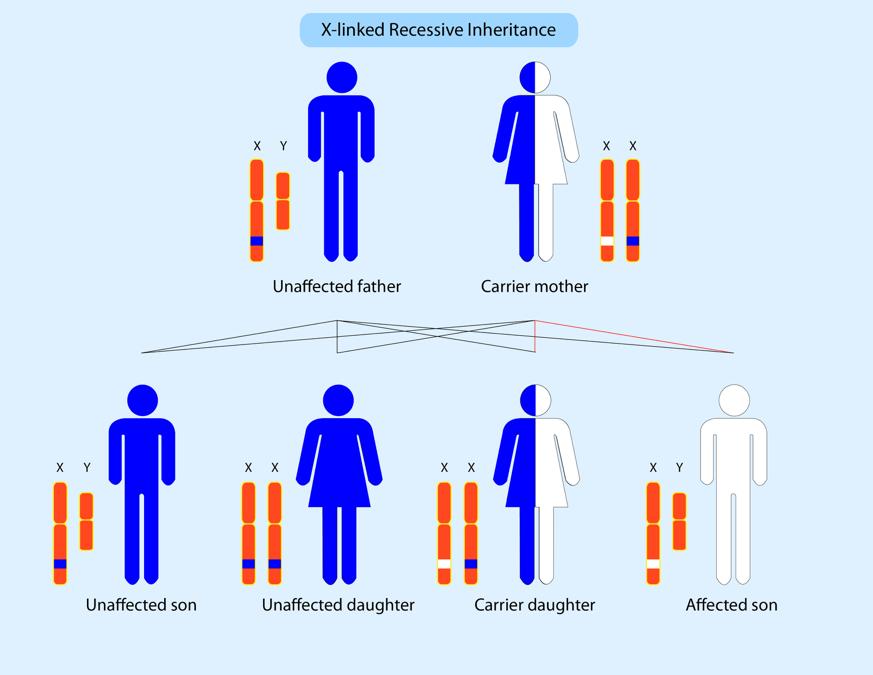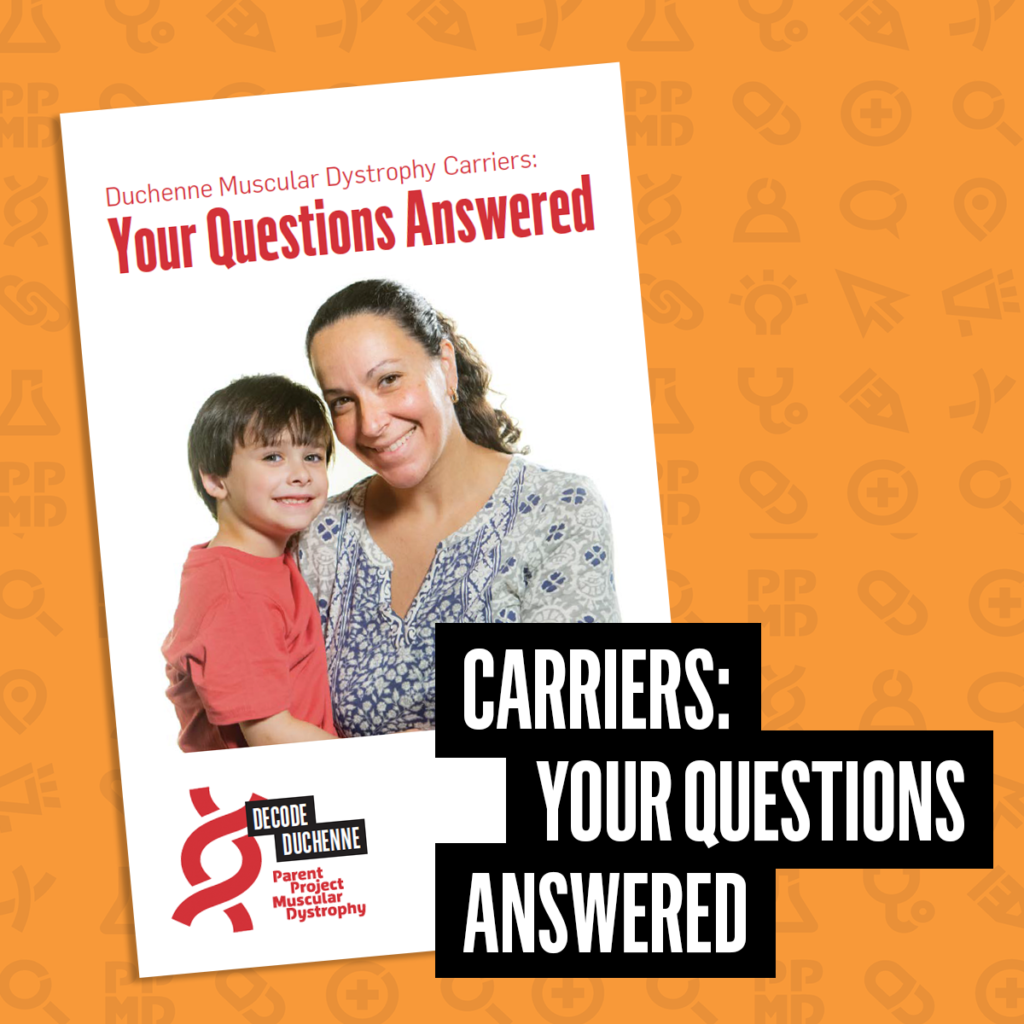For Carriers
Duchenne Carrier one-pagerWhat is a Carrier?
A carrier is a person who “carries” a genetic mutation in any of their genes that could be passed on to their children. Because the mutation for Duchenne is found on the X chromosome, only females can be carriers for the mutation on the gene that encodes for dystrophin protein. Carriers have an increased chance of having sons with Duchenne and daughters who are carriers.
Carriers can have some symptoms of Duchenne, such as muscle weakness and heart problems. Though it is rare, some females can have the classic symptoms of Duchenne, and they are known as manifesting carriers. All carriers should be evaluated by a healthcare provider familiar with Duchenne.
A carrier can include:
- females who have a child or children with Duchenne
- females who have close family members with Duchenne
- females who have symptoms of Duchenne
- females who have no family history of Duchenne and no symptoms of Duchenne
It is important to remember that Duchenne is not always inherited from a carrier mother. Approximately 70% (2 out of 3) of children born with Duchenne have inherited the genetic mutation from their mother who is a carrier. However, approximately 30% (1 out of 3) of children born with Duchenne have a genetic change that started new in them and was not inherited from their mother. This is called a “spontaneous mutation” or a “de novo” mutation. The mother of a child with a spontaneous mutation is not a carrier.
What is a Manifesting Carrier?
A manifesting carrier is a female who exhibits all or some of the same symptoms as a male with Duchenne. While there are tests to see if a female is a carrier of a Duchenne mutation, there are no tests that can show if a female will be a manifesting carrier. All females carriers should have their skeletal muscles monitored for strength, function, pain, and endurance and their hearts checked regularly by healthcare providers who are familiar with Duchenne.
In order to understand how some females manifest symptoms of Duchenne while others do not, it is helpful to understand some basic biology. Males are born with one X chromosome (from their mother) and one Y chromosome (from their father). Because males only have one X chromosome, if the X chromosome they receive has a Duchenne gene mutation, they will be affected with Duchenne.
Females are born with two X chromosomes (one from their mother and one from their father). If a female has one X chromosome that has a Duchenne gene mutation, most cells in the body will generally “inactivate” that X chromosome with the mutation. The female will be a carrier of Duchenne but usually she herself will have few, if any, symptoms of Duchenne. However, if most cells in the body choose to inactivate the normal X chromosome instead of the X chromosome with the Duchenne mutation, the female will be a Duchenne carrier and will likely exhibit, or “manifest,” symptoms of Duchenne. This is called “skewed X inactivation” and this is likely the reason why some females are manifesting carriers.
How is Duchenne passed through carriers?

This illustration shows how the mutation that causes an X-linked disorder can pass from a carrier woman to her children. As you can see, a carrier mother may or may not pass on the gene with the mutation—there is an equal chance each way.
Each time a carrier mother has a son, there is a 50% chance (or 1 out of 2) that he will be affected with Duchenne, and each time a carrier mother has a daughter, there is a 50% chance (or 1 out of 2) that she will be a carrier. Carriers have no control over which copy of their X chromosome they pass on to their children.
Learn more about how Duchenne is passed through carriers.
Why is genetic carrier testing important?
Genetic testing can determine whether a woman is definitely a carrier or whether she is very unlikely to be a carrier. Genetic testing is the best method for performing accurate carrier testing.
Carriers have an increased chance of having children with Duchenne or Becker, so if a woman knows she is a carrier, she can make more informed childbearing plans. There are many reproductive options available to carriers. Learn more about reproductive options for carriers.
Carriers also have an increased chance of heart problems and, sometimes, skeletal muscle weakness. If a woman knows she is a carrier, she should be evaluated regularly by a doctor who is familiar with Duchenne. Regular cardiology appointments are necessary, and referrals to other specialists may be needed. Learn more about Carrier Symptoms and Care.
Finally, genetic carrier testing is important because once one carrier is identified in a family, there could be several more carriers identified in the extended family. It is important to share this information with other females in the family so they can pursue carrier testing if desired. Learn more about carrier testing.
Does being a carrier affect a woman’s health?
Skeletal muscles
Most carrier females (about 80-90%) have no problems with their skeletal muscles. Some have mild muscle weakness, fatigue (a tired feeling), or cramping in their muscles. Rarely, a carrier has symptoms that are as severe as those of a male with muscular dystrophy.
Cardiac function
Carrier females have an increased chance of changes to heart function. It is not yet known how common heart changes are, but some studies have estimated that 10-50% of carriers have heart changes. The large majority of carriers will never need heart treatment or have health effects. However, because a small percentage of carriers may have serious heart concerns, it is important for all women who are carriers and women who are at risk to be carriers (but have not had genetic testing yet) to have regular heart evaluations, beginning in their late teens to early adult years.
Are there reproductive options for carriers?
There are many different reproductive options for carrier families with a higher chance of having a child with Duchenne. Learn more about reproductive options for carriers.
What does it mean to have germline mosaicism?
If a woman has a child with Duchenne and she has genetic carrier testing performed and it is negative, you might think that she is not at risk to have another affected child since her carrier testing was negative. But several studies have reported women having a second affected child even after negative carrier testing. This is due to “germline mosaicism”, which mean that some of her egg cells (her “germline”) carry the Duchenne gene mutation whereas other egg cells do not. However, she does not carry the Duchenne gene mutation in her blood cells, which is why her genetic testing was negative.
Germline mosaicism is not believed to be very common, although it is almost impossible to determine how many women are germline mosaics. The majority of carriers of the Duchenne mutation are somatic carriers, meaning they carry the Duchenne gene mutation in every cell of their body. Learn more about germline mosaic carriers.
How can I learn more about being a carrier?
In the past, there has not been a great deal of research focused on female carriers, but this is changing. The Duchenne Registry, started by PPMD in 2007, has always collected data on female carriers. In fact, we encourage all carriers to consider joining The Duchenne Registry.
If you have a child with Duchenne and they already have a registry account, you can add yourself to their account in the Family Member box and you both would share the same username and password. Carriers can also register themselves separately by creating a new account with a unique username and password.
Either way, the data you share will help us advance research by providing a better understanding of the impact of being a carrier and the significance of different types of genetic changes.
If you are interested in learning about clinical trials focused on carriers, please visit our Explore Clinical Trials section and select “Studies for Female Carriers.”
DOWNLOAD: PPMD’s 15 Year Registry Report
In the past, there has not been a great deal of research focused on female carriers, but this is changing. While The Duchenne Registry has always collected data on female carriers, the 15 Year Registry Report includes insights on this population for the first time. Download the report to learn more.
Download the report DOWNLOAD: Duchenne Carriers – Your Questions Answered
DOWNLOAD: Duchenne Carriers – Your Questions Answered
Being a carrier of Duchenne can affect so many aspects of a woman’s life, including health care, family planning, and mental health. As part of our efforts to better understand and support carrier issues, this comprehensive guide addresses the questions most often asked by carriers. It was developed in collaboration with carriers and with expert providers from neurology, genetics, cardiology, and psychology.
Download: English >Download: Spanish >





